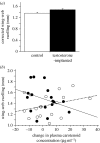Do carotenoids buffer testosterone-induced immunosuppression? An experimental test in a colourful songbird
- PMID: 17550877
- PMCID: PMC2390673
- DOI: 10.1098/rsbl.2007.0190
Do carotenoids buffer testosterone-induced immunosuppression? An experimental test in a colourful songbird
Abstract
Testosterone (T) is hypothesized to be an important honesty reinforcer of animal sexual signals. Owing to its immunosuppressive effects, only those individuals that can immunologically withstand high T levels can develop the most exaggerated traits. To date, few studies have isolated phenotypic or genotypic buffers that provide 'high-quality' animals with such an advantage. Dietary carotenoid pigments may in fact confer such a benefit because when in high supply carotenoids boost immunocompetence and coloration in animals like birds and fishes. We examined the experimental effect of T elevation on carotenoid and immune status in male and female zebra finches (Taeniopygia guttata) and found that T was immunostimulatory in a generalized cell-mediated challenge. We also detected a significant interaction between T treatment and the change in plasma carotenoids that occurred during the immune challenge; the relationship between blood carotenoid change and immunity was positive in controls and negative in T-implanted birds. This suggests that, while correlationally birds with high carotenoid stores were inherently better at mounting strong immune responses, experimentally administered T induced birds to deplete carotenoids for maximizing their health. Our findings highlight a nutrient-specific mechanism by which animals escape high immune costs of T elevation and thus can still elevate ornamentation.
Figures

References
-
- Alonso-Alvarez C, Bertrand S, Devevey G, Gaillard M, Prost J, Faivre B, Sorci G. An experimental test of the dose-dependent effect of carotenoids and immune activation on sexual signals and antioxidant activity. Am. Nat. 2004;164:651–659. doi:10.1086/424971 - DOI - PubMed
-
- Blas J, Perez-Rodriguez L, Bortolotti G.R, Vinuela J, Marchant T.A. Testosterone increases bioavailability of carotenoids: insights into the honesty of sexual signaling. Proc. Natl Acad. Sci. USA. 2006;103:18 633–18 637. doi:10.1073/pnas.0609189103 - DOI - PMC - PubMed
-
- Blount J.D, Metcalfe N.B, Birkhead T.R, Surai P.F. Carotenoid modulation of immune function and sexual attractiveness in zebra finches. Science. 2003;300:125–127. doi:10.1126/science.1082142 - DOI - PubMed
-
- Burley N, Coopersmith C. Bill colour preferences of zebra finches. Ethology. 1987;76:133–151.
-
- Folstad I, Karter A.J. Parasites, bright males, and the immunocompetence handicap. Am. Nat. 1992;139:603–622. doi:10.1086/285346 - DOI
Publication types
MeSH terms
Substances
LinkOut - more resources
Full Text Sources
Molecular Biology Databases
